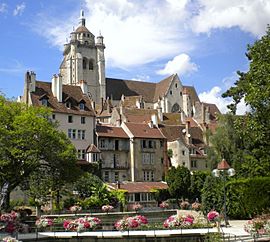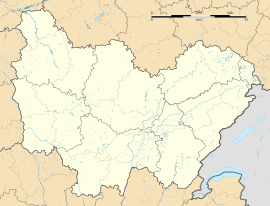Dole, Jura facts for kids
Quick facts for kids
Dole
|
||
|---|---|---|

Old Dole
|
||
|
||
| Country | France | |
| Region | Bourgogne-Franche-Comté | |
| Department | Jura | |
| Area
1
|
38.38 km2 (14.82 sq mi) | |
| Population
(2012)
|
23,685 | |
| • Density | 617.12/km2 (1,598.33/sq mi) | |
| Time zone | UTC+01:00 (CET) | |
| • Summer (DST) | UTC+02:00 (CEST) | |
| INSEE/Postal code |
39198 /39100
|
|
| Elevation | 196–341 m (643–1,119 ft) | |
| 1 French Land Register data, which excludes lakes, ponds, glaciers > 1 km2 (0.386 sq mi or 247 acres) and river estuaries. | ||
Dole is a lovely town, also known as a commune, located in the Jura department in eastern France. It's a place with a rich history and beautiful old buildings. The town sits by the Doubs River, which adds to its charm.
For a long time, Dole was the capital city of a region called the Free County. This was a very important role! However, this changed when King Louis XIV of France took control of the area. After that, the capital moved to Besançon. Even though it's no longer the capital, Dole remains a significant and interesting town in the Jura department.
Contents
Where is Dole?
Dole is found in the eastern part of France. It is part of the Jura department, which is known for its beautiful landscapes and mountains. The town is built along the Doubs River, which flows through the region. This river has been important for Dole throughout its history.
How Big is Dole?
Dole covers an area of about 38.38 square kilometers. In 2012, about 23,685 people lived there. This makes it one of the larger towns in the Jura department. The town's elevation, or how high it is above sea level, ranges from 196 meters to 341 meters.
A Look at Dole's History
Dole has a long and interesting past. It was once a very powerful and important city. Being the capital of the Free County meant it was a center for government and trade.
Dole as a Capital City
For many years, Dole was the main city of the Free County of Burgundy. This region was not always part of France. It was an independent area with its own rulers. Dole had important buildings like a parliament and a university. This made it a busy and lively place.
When Louis XIV Conquered the Region
The history of Dole changed in the 17th century. King Louis XIV of France wanted to expand his kingdom. His armies conquered the Free County. After this, the region became part of France. The capital was then moved from Dole to Besançon. Even though Dole lost its capital status, it kept its historical buildings and charm.
What to See in Dole Today
Dole is a great place to visit. It has many old buildings that show its long history. Walking through the town feels like stepping back in time.
Famous Landmarks
One of the most famous buildings is the Collegiate Church of Notre-Dame. It's a beautiful church with a tall bell tower. You can see it from many parts of the town. Another interesting spot is the Birthplace of Louis Pasteur. Louis Pasteur was a very famous French scientist. His house is now a museum.
The Old Town and Canals
The old part of Dole is full of narrow streets and old houses. Many of these houses are built along the Doubs River and its canals. The canals were once used for trade and transport. Today, they add to the town's beauty. You can often see small boats on the water.
Life in Dole
Life in Dole today mixes its rich history with modern living. People in Dole enjoy a good quality of life. The town has schools, shops, and places for fun.
Local Economy
Dole has a mix of industries. It has some factories, but it also relies on tourism. Many people visit to see its historical sites. The local markets sell fresh produce and regional goods.
Culture and Events
The town often hosts cultural events and festivals. These events celebrate local traditions and arts. There are also museums and art galleries to explore. Dole is a place where history and culture are very much alive.
See also
 In Spanish: Dole (Jura) para niños
In Spanish: Dole (Jura) para niños
 | John T. Biggers |
 | Thomas Blackshear |
 | Mark Bradford |
 | Beverly Buchanan |




